Femia > Health Library > Getting Pregnant > Planning pregnancy > Boosting your fertility: Tips for getting pregnant in your 30s
Boosting your fertility: Tips for getting pregnant in your 30s
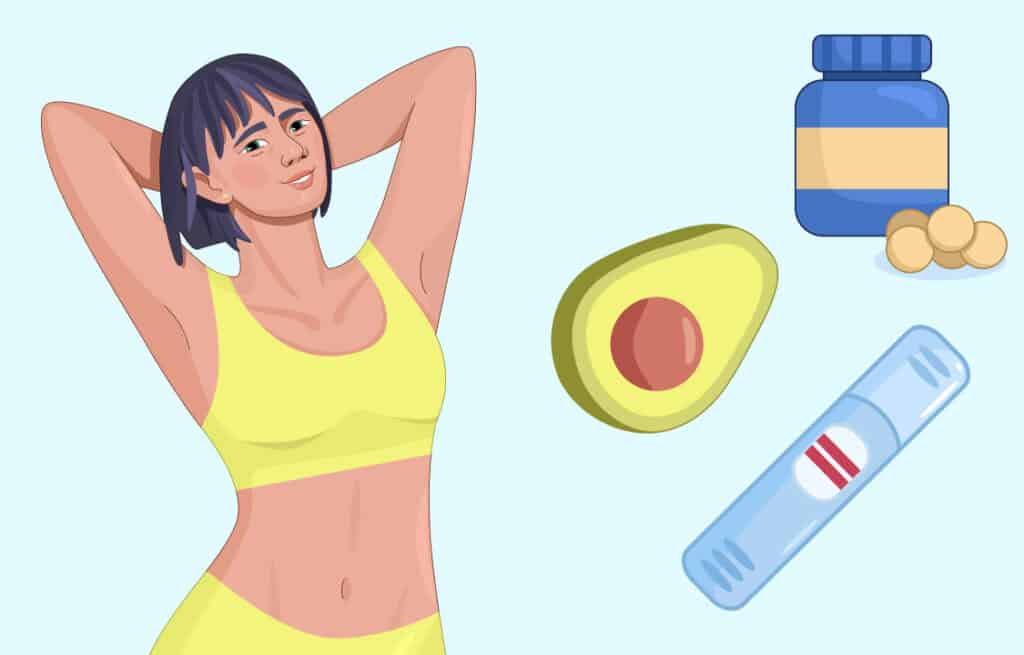
- Updated Feb 10, 2025
- Published
CRAFTED BY HUMAN
Crafted by human At Femia, we provide accurate and up-to-date information at every stage of your journey, from trying to conceive, pregnancy and postnatal support. All content is created by a real person based on in-depth research and own professional experience. Femia ensures that you will receive expert advice, strict accuracy and a personalized approach from our authors/medical experts. Learn more about our editorial policy.
FACT CHECKED
Fact checked At Femia Health, we maintain the highest standards of editorial excellence in delivering content focused on helping you conceive, guiding you through pregnancy, and supporting you postpartum. Explore our content review principles to learn how we ensure the accuracy and quality of our health and lifestyle tips for every stage of your journey.
Many women successfully get pregnant in their 30s. You can optimize your fertility naturally by tracking ovulation, maintaining a healthy weight, managing stress, and adopting a balanced fertility-boosting diet. Consult a healthcare provider if you face challenges.
Are you in your thirties and trying to get pregnant? You are not alone: women today are having children later than any other previous generation, with many women looking to start a family in their 30s.
Most women under 40 will conceive naturally within a year, but for some, the process can feel long and frustrating. Whilst you probably know that fertility declines with age, particularly as you reach your mid to late 30s, what you might not know is that there are several scientifically-backed ways you can naturally optimize fertility and increase your chances of getting pregnant.
Femia offers the most accurate tool for determining ovulation and fertile days
Advantages of getting pregnant in your 30s
While having a baby in your 20s might be easier biologically, there are notable benefits to starting a family in your 30s. By this age, you may have more financial stability and a well-established career, which can provide a secure environment for raising a child.
Research shows that women who have their first child at or after age 33 may have a better chance of living to age 95 compared to younger mothers. Additionally, studies suggest that children born to older mothers often experience fewer behavioral, social, and emotional issues. These mothers are also less likely to use harsh disciplinary methods, which can positively impact their children’s development.
The risks of getting pregnant after 30
lder women are more likely to experience miscarriage, stillbirth, gestational diabetes, preeclampsia, the risk for chromosome problems and delivering a baby who is smaller than average. There’s also a higher chance of complications during labor, which can lead to an increased likelihood of needing a cesarean section. Additionally, pregnancy raises the risk of blood clots (deep vein thrombosis), and this risk is even greater for older mothers.
The risks associated with pregnancy continue to increase gradually as you age beyond 35, but it’s important to remember that this milestone doesn’t mark an abrupt change. Your individual risk depends on your overall health and personal history, so working closely with your healthcare provider can help manage these risks and support a healthy pregnancy.
@femia.fertility Dreaming of a faster way to get pregnant? 🤰✨ Femia's got you covered with the smoothest path to natural pregnancy! Be part of our growing community of 500k+ women worldwide who've achieved their dreams with us. Download Femia app and let's start your journey!💕 #tryingtoconceive #ttcjourney #fertilityjourney #pregnancyover30 ♬ original sound - Femia fertility tracker
How to boost fertility and get pregnant at 30s
So, how do you boost your fertility and increase your chances of getting pregnant naturally in your 30s? Below is a guide on scientifically backed measures that can help you get pregnant as well as advice on when you should seek medical intervention.
1. Track ovulation
Tracking ovulation can have the biggest impact on your chances of conceiving.
The average menstrual cycle lasts around 28 days, but “normal” can range anywhere from 21–35 days. We count days starting on the first day of your period and finishing the day before your next period. Your “fertility window” is the period during your cycle when you’re most likely to get pregnant if you have sex. The fertile window starts five days before ovulation and finishes 12–24 hours after an egg is released.
Research shows that ovulation can be unpredictable and vary from cycle to cycle, but tracking your ovulation can tell you when you’re most fertile. Women commonly use apps, likeFemia, to track their cycle and keep a digital record of the signs of ovulation, like a rise in your basal body temperature or an increase in cervical mucus. Using ovulation predictor kits can also tell you when your body is about to ovulate.
The Fertility awareness-based methods for women’s health and family planning study found in 2022 that 85% of couples will conceive within 12 months of trying, but for couples who are tracking ovulation, 90% will conceive in 6 months through fertility-focused intercourse.
The same study also noted that if a woman has difficulty conceiving, then the information they have collected using an app like Femia can be used by their healthcare professional to detect any underlying problems.
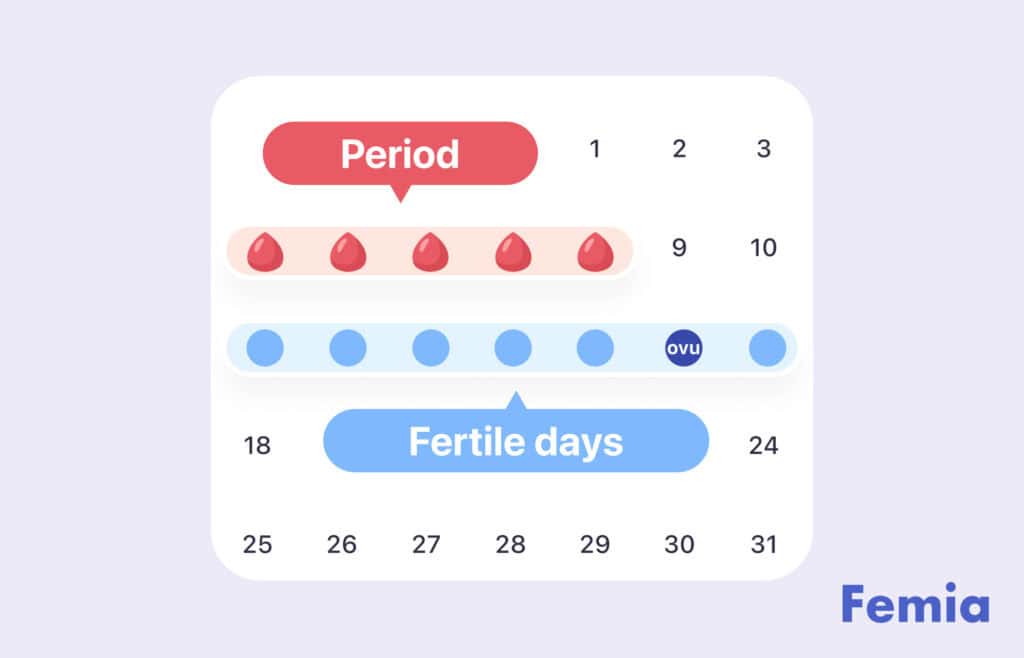
2. Maintain a healthy weight
Being over or underweight is known to affect fertility and reduce your chances of getting pregnant. Maintaining a healthy weight is a good way to prepare for pregnancy in your 30s.
Both high and low BMIs can affect how much estrogen is circulating in your body. Estrogen is an important hormone that helps regulate the menstrual cycle and triggers the ovaries to develop and release a healthy egg during ovulation.
A high BMI can mean you have high levels of insulin in your body, which can increase the amount of estrogen your body produces. Too much estrogen causes irregular menstrual cycles and ovulatory dysfunction, and the American Society for Reproductive Medicine and the Society for Reproductive Endocrinology and Infertility have found that women with a BMI >35 take twice as long to conceive as those with a healthy BMI.
Having a BMI <19 can also affect fertility. The National Health and Nutrition Examination Survey of over 3,000 participants found that a low BMI also leads to irregular periods and can reduce fertility.
Tips to help you maintain a healthy weight:
- Eat a balanced diet. Swap out foods that are high in sugar or saturated fat for a healthier alternative—for example, switch to whole grain breads and cereals.
- Don’t go extreme. Extreme dieting or exercise can cause health and fertility issues and are not effective ways to lose weight.
- Get active. It only takes 20–30 mins a day of exercise to help you maintain a healthy weight. Look for an activity that you enjoy and that increases your heart rate, such as swimming, walking, or an exercise class with a friend.
- Stay hydrated. Try to drink six to eight glasses of water a day. If you don’t like the taste, add lemon, berries, or lime rather than sugary flavoring.
- Cut down on alcohol. Alcohol can be surprisingly calorific.
- Find a buddy. Ask someone you know and trust to join you on your journey and keep you motivated.
- Talk to a healthcare professional. If you are struggling to lose or gain weight, speak to your healthcare provider.
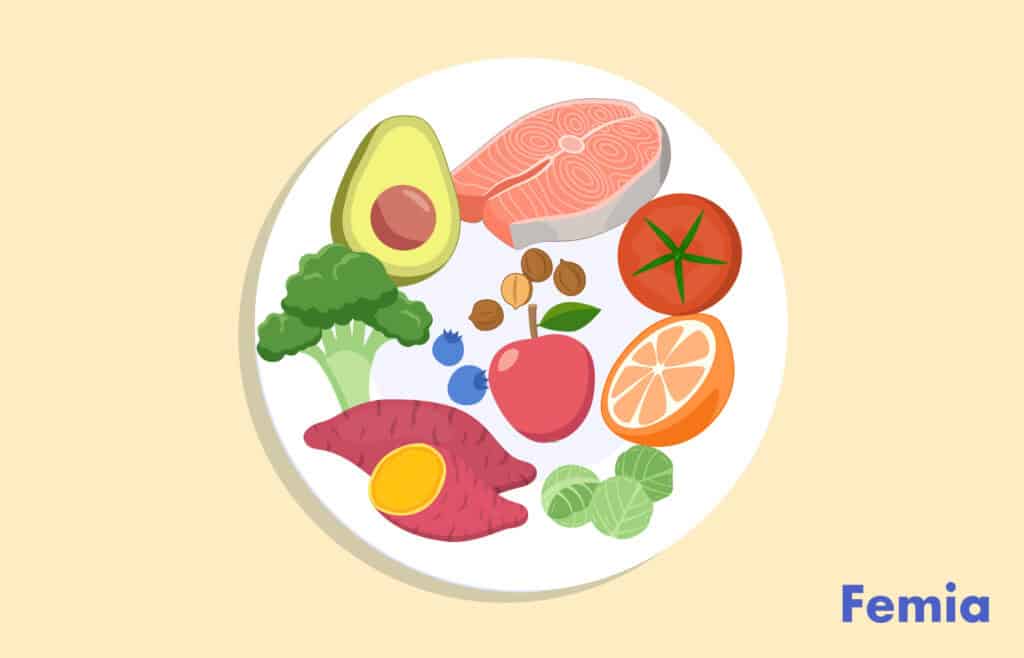
3. Eat a balanced diet
Nutrition and fertility are closely linked: one study of Glycemic load, dietary fiber, and added sugar and fecundability in 2 preconception cohorts found that having a diet high in sugar and refined carbohydrates increases blood glucose levels, leads to insulin resistance, and increases the amount of insulin circulating in your body. This causes problems ovulating and can reduce fertility.
The same study found that eating a diet high in fiber protects your body against insulin resistance and reduces your chances of developing a problem with ovulation.
Omega-3 fatty acids have also been found to increase fertility naturally. The Omega-3 fatty acid supplementation and fecundability 2022 study found that women are 1.5 times more likely to conceive if they’re taking an omega-3 supplement.
Tips to improve your diet:
- Be aware. It is not possible to overhaul your diet in a day—start by paying attention to what is in the foods you regularly eat, and make a list of the least healthy foods that you want to change.
- Start your day with a smoothie. Smoothies can be a delicious way to increase the variety of fruits, vegetables, nuts, and seeds you eat and naturally boost your fertility.
- Soups are underrated. Switching out a carb-heavy lunch like a sandwich for a vegetable or bean soup will keep you satisfied but reduce your sugar and carb intake. It can also increase your fiber and omega-3 consumption and help boost your fertility.
- Make a swap. Swap your high-carb white bread and pasta for the healthier whole grain alternative. This will cut down on unnecessary sugars without compromising the meals you can cook.
- Consider supplements. Whilst salmon, chia seeds, and walnuts are great natural sources of omega-3, there are many reasons why people struggle to introduce them into their diet. Consider the next best thing: taking a supplement.
👉Find out more: Enhancing fertility naturally: A guide to fertility supplements and foods for women
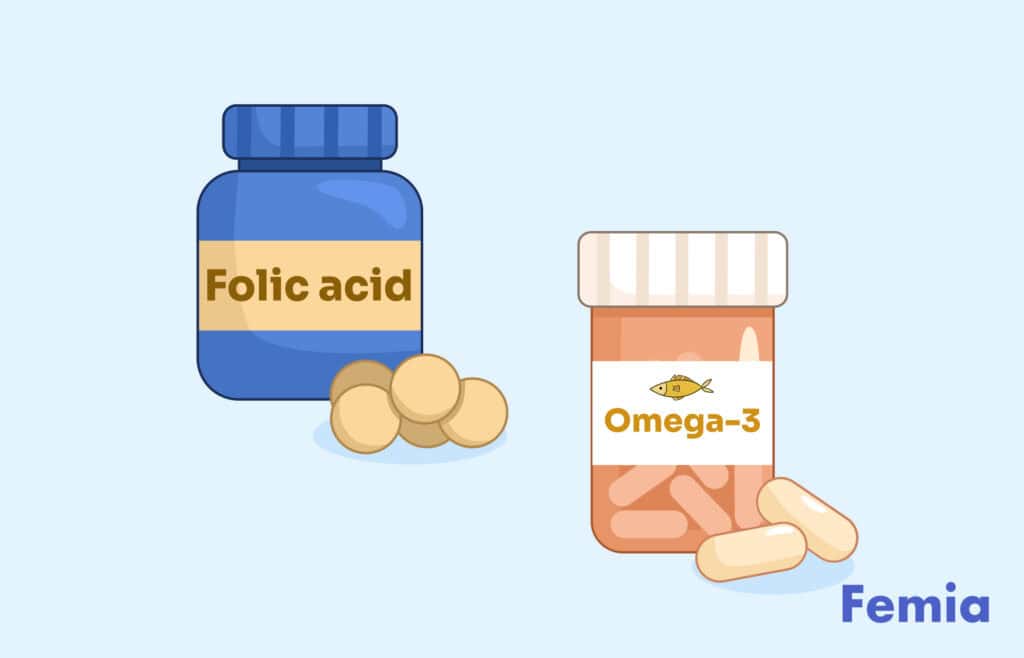
4. Manage stress effectively
Stress can cause irregular menstrual cycles and may impact ovulation. Although the link between stress and fertility is still widely debated, the Danish study of north american couples found that high stress levels reduced fertility in some women.
Whilst lifestyle measures can help you to manage low levels of stress, it is important to seek help from your healthcare provider if your stress is overwhelming or impacting your life. Stress is a common health issue, and if you’re suffering high levels of stress, it is best to speak to your healthcare provider first. They will be able to discuss different approaches and help you to find the best way to manage your stress or anxiety.
Consider the following lifestyle measures to reduce stress levels and improve overall well being:
- Do something you enjoy. Find a relaxation technique that you enjoy such as yoga, meditation, prayer, or deep breathing exercises.
- Make time. Prioritize “me time.” We know it can be hard, and women often feel guilty prioritizing themselves, but carving out even 20 minutes of your day to focus on yourself can have a big impact.
- Set a reminder. In this busy world, the small things often get forgotten. Set a timer on your phone at a time of day you are most likely to be available to remind yourself.
- Practice makes perfect. Like most healthy lifestyle habits, you won’t notice a difference overnight. But, stick with it for a couple of weeks, and you should start to notice a benefit.
5. Avoid drinking alcohol
You probably already know that drinking alcohol during pregnancy is not recommended. Alcohol can harm the fetus, even in the earliest stages, and as there is no “safe limit” for consumption, complete abstinence is advised.
But, did you know that drinking alcohol whilst you’re trying to get pregnant is also not advised? The Follow up study among couples planning first pregnancy looked at the drinking habits of over 400 couples and found that even if you drink less than five alcoholic drinks a week, your fertility can be affected.
Alcohol-free beer and wine used to be considered a poor second choice; however, new technology and a boom in consumer demand has changed the game. Many craft beer companies are now producing delicious alcohol-free alternatives that rival the real deal. So if you find yourself craving a cold beverage on a warm summer’s day, then consider reaching for one of the many alcohol-free versions now available.
6. Reduce your caffeine intake
Drinking one or two cups of coffee a day will not affect fertility. However, drinking more than 500mg of caffeine a day, roughly equivalent to 5 cups of coffee, can impact your chances of getting pregnant.
Do:
- Continue to enjoy your morning latte or flat-white
- Consider drinking green tea— The Therapeutic role of green tea polyphenols in improving fertility study found that the unique antioxidant properties of green tea can boost fertility in both men and women
- Consider going decaf after the first cup or two of coffee
Don’t:
- Drink more than 500mg of caffeine a day
- Forget to include other sources of caffeine, such as some teas and energy drinks when calculating your daily consumption
7. Quit smoking
Smoking by either partner can harm your chances of getting pregnant. The study of Edward E. Wallach M.D., Edward G. Hughes M.B., Ch.B., and Barbara G. Brennan M.D., Ph.D. has found that women who smoke are more likely to have problems getting pregnant, and smoking can lead to menopause starting up to two years earlier. The same study found that even passive smoke exposure can affect your fertility as much as if you were a smoker, in some cases.
Tips to help you quit:
- Speak to a healthcare professional. It can be very hard to successfully stop smoking, but there are treatments and medications that can help. Your healthcare provider is the best person to talk to if you want to quit smoking.
- Reduce secondhand smoking. Being around heavy smokers can harm your fertility. If they are unable to quit, then try to reduce the amount of smoke you are exposed to by restricting smoking to outdoor only.
- Don’t give up. The Estimating the number of quit attempts it takes to quit smoking successfully in a longitudinal cohort of smokers study has found that whilst some people are able to quit smoking on the first try, for others it can take more than 30 attempts. So, even if you have tried and failed before, it is always worth trying again.
Femia offers the most accurate tool for determining ovulation and fertile days
8. Exercise moderately
Exercising moderately is an important part of being healthy.
A high BMI reduces fertility, but losing weight through exercise and diet has been found to significantly increase a woman’s chances of getting pregnant if they have obesity.
On the other end of the spectrum, excessive exercise can also disrupt your periods and stop you from ovulating. Intense exercise for more than 3-4 hours a week was found to reduce the chances of conceiving by almost 30%.
If you love to exercise but are trying to get pregnant, then try switching your choice of exercise to something less intense. For example, replace a run with a brisk walk or a HIIT session with yoga.
👉Find out more: How to get pregnant with endometriosis naturally: Tips and strategies
9. Take folic acid
Taking certain vitamins and minerals whilst you’re trying to get pregnant can naturally optimize your fertility.
- Folic acid supplements: We know that folic acid is an important vitamin to take during pregnancy, but some studies suggest that taking it when you start trying to conceive can increase your chances of getting pregnant.
- Vitamin D: Low vitamin D levels may reduce fertility. Talk to your health provider if you think you could be low.
- Iron: Too much or too little iron could affect fertility. Talk to a healthcare professional if you have any concerns about your iron levels.
10. Enjoy sex
If you have been trying to get pregnant for a while, then having sex may start to feel like a chore.
When intimacy becomes less about enjoying time with your partner and more about tracking windows and measuring your body temperature, the added stress can impact your chances of conceiving.
Whilst it is important to have sex during your fertile window, ideally 2–3 days before ovulation, you don’t need to have sex every single day. If you are confident about when your fertile window is, then sex every other day during this time should be enough to increase your chances of getting pregnant.
If you use any products like lube during sex, make sure to check that they don’t affect fertility. Some lubricants can decrease sperm movement and prevent you from getting pregnant.
11. Seek medical advice when needed
When it comes to getting pregnant, knowing when to seek medical advice is key.
The majority of healthy couples will conceive within a year. But, for personalized tips on how to optimize your fertility naturally, talking to your healthcare provider can help you to work out what strategies are best for you.
If you have been trying to get pregnant for a while, have had multiple miscarriages, or have any health conditions that may impact your fertility, talk to your healthcare provider. They can decide if any further investigation or specialist involvement is needed.
Consider seeking medical advice if:
- You or your partner have any known health problems that can affect fertility
- Are under 35 and have been trying for 12 months or more
- Are 35–40 and have been trying for 6 months or more
- Are over 40 and wanting to conceive
- Have had multiple miscarriages
- Take a medication that could impact fertility or is not recommended during pregnancy
- Have any concerns about your fertility
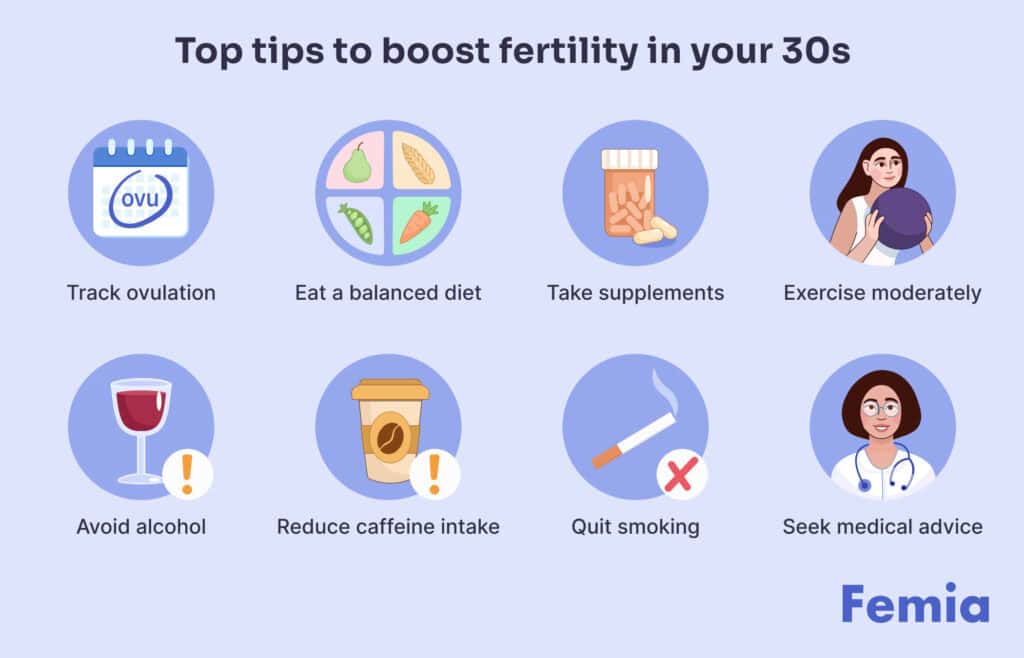
Questions from the Femia community
Is it harder to get pregnant after 30?
Fertility starts to decline around the age of 30; however, many women will successfully conceive in their 30s. Whilst you cannot prevent this age-related decline in fertility, healthy living and having ovulation-targeted sex can increase your chances of getting pregnant naturally.
What are some early signs of fertility issues?
The main symptom of possible fertility issues is not being able to get pregnant when you’re trying to. If you are under 35 and have been trying to get pregnant for more than 12 months, or if you are over 35 and have been trying for more than 6 months, then you and your partner should speak to your healthcare professional.
Other signs of fertility issues can include: irregular menstrual cycles that are either too long or too short, absent periods, very heavy or painful periods, medical conditions such as PCOS.
Can I still get pregnant if I have irregular periods?
Yes. Having irregular periods does not necessarily mean that you cannot get pregnant. While having a menstrual cycle that is longer or shorter than average can be a sign of fertility issues for some women, many who have an irregular menstrual cycle are still ovulating and can therefore get pregnant.
However, having an irregular cycle can make it more challenging to predict ovulation. Using various methods to track your ovulation such as ovulation predictor kits and tracking apps can help you identify when you’re fertile and improve your chances.
Can alternative therapies like acupuncture help with fertility?
The use of acupuncture to improve fertility in women has long been debated. A recent 2022 study found that acupuncture can be a useful complementary therapy for women struggling to get pregnant. It has been found to help balance reproductive hormones and increase blood flow to reproductive organs, so for women whose fertility issues are due to these reasons it could therefore be helpful.
However, the study notes that results from trials have not been consistent and further, more rigorous studies are required to fully understand the impact.
The bottom line
Many women in their thirties will conceive naturally within a year, but don’t worry if it doesn’t happen straight away. That doesn’t mean that it won’t happen at all.
To increase your chances of conceiving, make sure you know when your fertile window is and are having regular sex during this period. Other simple lifestyle measures like maintaining a healthy weight, cutting out smoking, and reducing caffeine can also boost your fertility as well as improving your health generally.
Staying relaxed during the process is also important; however, if you feel it is taking longer than it should for you to conceive or you have any other concerns, then it is important to get in touch with your healthcare professional, who can advise you of the best way forward.
References
- Best, Damian, et al. “How Effective Are Weight-loss Interventions for Improving Fertility in Women and Men Who Are Overweight or Obese? A Systematic Review and Meta-analysis of the Evidence.” Human Reproduction Update, vol. 23, no. 6, Sept. 2017, pp. 681–705. https://doi.org/10.1093/humupd/dmx027.
- Broughton, Darcy E., and Kelle H. Moley. “Obesity and Female Infertility: Potential Mediators of Obesity’s Impact.” Fertility and Sterility, vol. 107, no. 4, Apr. 2017, pp. 840–47. https://doi.org/10.1016/j.fertnstert.2017.01.017.
- Chaiton, Michael, et al. “Estimating the Number of Quit Attempts It Takes to Quit Smoking Successfully in a Longitudinal Cohort of Smokers.” BMJ Open, vol. 6, no. 6, June 2016, p. e011045. https://doi.org/10.1136/bmjopen-2016-011045.
- Cobb, Amanda Sharfman and Pamela. Childbearing for Women Born in Different Years, England and Wales – Office for National Statistics. 1 Feb. 2024, www.ons.gov.uk/peoplepopulationandcommunity/birthsdeathsandmarriages/conceptionandfertilityrates/bulletins/childbearingforwomenbornindifferentyearsenglandandwales/2021and2022.
- Duane, Marguerite, et al. “Fertility Awareness-Based Methods for Women’s Health and Family Planning.” Frontiers in Medicine, vol. 9, May 2022, https://doi.org/10.3389/fmed.2022.858977.
- DeCherney, Alan H., and Gertrud S. Berkowitz. “Female Fecundity and Age.” New England Journal of Medicine” vol. 306, no. 7, Feb. 1982, pp. 424–26. https://doi.org/10.1056/nejm198202183060712.
- Fartushok, Tetiana V., et al. “WAYS TO IMPROVE NATURAL FERTILITY.” Wiadomości Lekarskie, vol. 74, no. 1, Jan. 2021, pp. 144–49. https://doi.org/10.36740/wlek202101128.
- “Female Age-Related Fertility Decline.” ACOG, www.acog.org/clinical/clinical-guidance/committee-opinion/articles/2014/03/female-age-related-fertility-decline.
- “Female Infertility – Symptoms and Causes – Mayo Clinic.” Mayo Clinic, 27 Aug. 2021, www.mayoclinic.org/diseases-conditions/female-infertility/symptoms-causes/syc-20354308.
- Findlay, J. K., et al. “Estrogen Signaling in the Regulation of Female Reproductive Functions.” Handbook of experimental pharmacology, 2010, pp. 29–35. https://doi.org/10.1007/978-3-642-02062-9_2.
- “Irregular Periods.” nhs.uk, 11 Mar. 2024, www.nhs.uk/conditions/irregular-periods/#:~:text=Causes%20of%20irregular%20periods&text=puberty%2C%20when%20you%20start%20your,injection%20and%20intrauterine%20system%20(IUS).
- Jensen, T. K., et al. “Does Moderate Alcohol Consumption Affect Fertility? Follow up Study Among Couples Planning First Pregnancy.” BMJ. British Medical Journal, vol. 317, no. 7157, Aug. 1998, pp. 505–10. https://doi.org/10.1136/bmj.317.7157.505.
- Mussawar, Minhal, et al. “The Effect of Physical Activity on Fertility: A Mini-review.” F&S Reports, vol. 4, no. 2, June 2023, pp. 150–58. https://doi.org/10.1016/j.xfre.2023.04.005.
- Pilz, Stefan, et al. “The Role of Vitamin D in Fertility and During Pregnancy and Lactation: A Review of Clinical Data.” International Journal of Environmental Research and Public Health/International Journal of Environmental Research and Public Health, vol. 15, no. 10, Oct. 2018, p. 2241. https://doi.org/10.3390/ijerph15102241.
- Rahman, Sajid, et al. “Therapeutic Role of Green Tea Polyphenols in Improving Fertility: A Review.” Nutrients, vol. 10, no. 7, June 2018, p. 834. https://doi.org/10.3390/nu10070834.
- Skoracka, Kinga, et al. “Female Fertility and the Nutritional Approach: The Most Essential Aspects.” Advances in Nutrition, vol. 12, no. 6, Nov. 2021, pp. 2372–86. https://doi.org/10.1093/advances/nmab068.
- Stanhiser, J., et al. “Omega-3 Fatty Acid Supplementation and Fecundability.” Human Reproduction, vol. 37, no. 5, Feb. 2022, pp. 1037–46. https://doi.org/10.1093/humrep/deac027.
- “Tips to Help You Lose Weight.” nhs.uk, 15 Dec. 2023, www.nhs.uk/live-well/healthy-weight/managing-your-weight/tips-to-help-you-lose-weight.
- “Trying to Get Pregnant.” nhs.uk, 20 Nov. 2023, www.nhs.uk/pregnancy/trying-for-a-baby/trying-to-get-pregnant.
- Wallach, Edward E., et al. “Does Cigarette Smoking Impair Natural or Assisted Fecundity?” Fertility and Sterility, vol. 66, no. 5, Nov. 1996, pp. 679–89. https://doi.org/10.1016/s0015-0282(16)58618-x.
- Wesselink, Amelia K., et al. “Perceived Stress and Fecundability: A Preconception Cohort Study of North American Couples.” American Journal of Epidemiology, vol. 187, no. 12, Aug. 2018, pp. 2662–71. https://doi.org/10.1093/aje/kwy186.
- Wilcox, A. J. “The Timing of the ‘Fertile Window’ in the Menstrual Cycle: Day Specific Estimates From a Prospective Study.” BMJ. British Medical Journal, vol. 321, no. 7271, Nov. 2000, pp. 1259–62. https://doi.org/10.1136/bmj.321.7271.1259.
- Willis, Sydney K., et al. “Glycemic Load, Dietary Fiber, and Added Sugar and Fecundability in 2 Preconception Cohorts.” The American Journal of Clinical Nutrition, vol. 112, no. 1, July 2020, pp. 27–38. https://doi.org/10.1093/ajcn/nqz312.
- Xu, Jing-Yu, et al. “Acupuncture for Female Infertility: Discussion on Action Mechanism and Application.” Evidence-based Complementary and Alternative Medicine, vol. 2022, July 2022, pp. 1–17. https://doi.org/10.1155/2022/3854117.
- Zhu, Lei, et al. “Association Between Body Mass Index and Female Infertility in the United States: Data From National Health and Nutrition Examination Survey 2013–2018.” International Journal of General Medicine, vol. Volume 15, Feb. 2022, pp. 1821–31. https://doi.org/10.2147/ijgm.s349874.
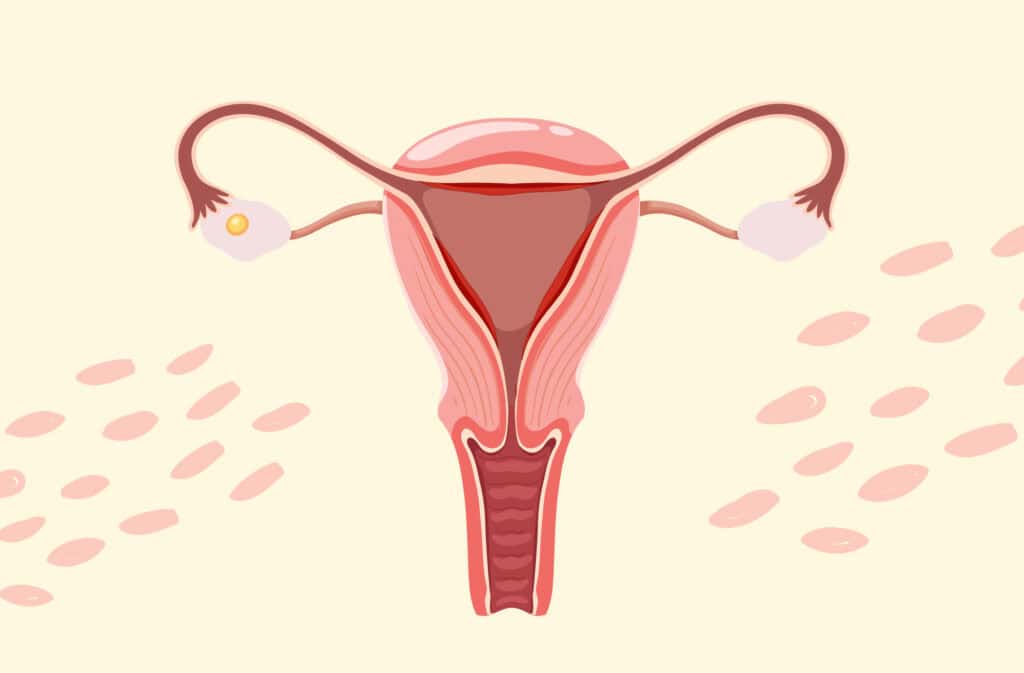
Learn about the follicular phase, its symptoms, and how to optimize your diet for better health. Discover key foods, hormonal changes, and tips for improved fertility and wellness.
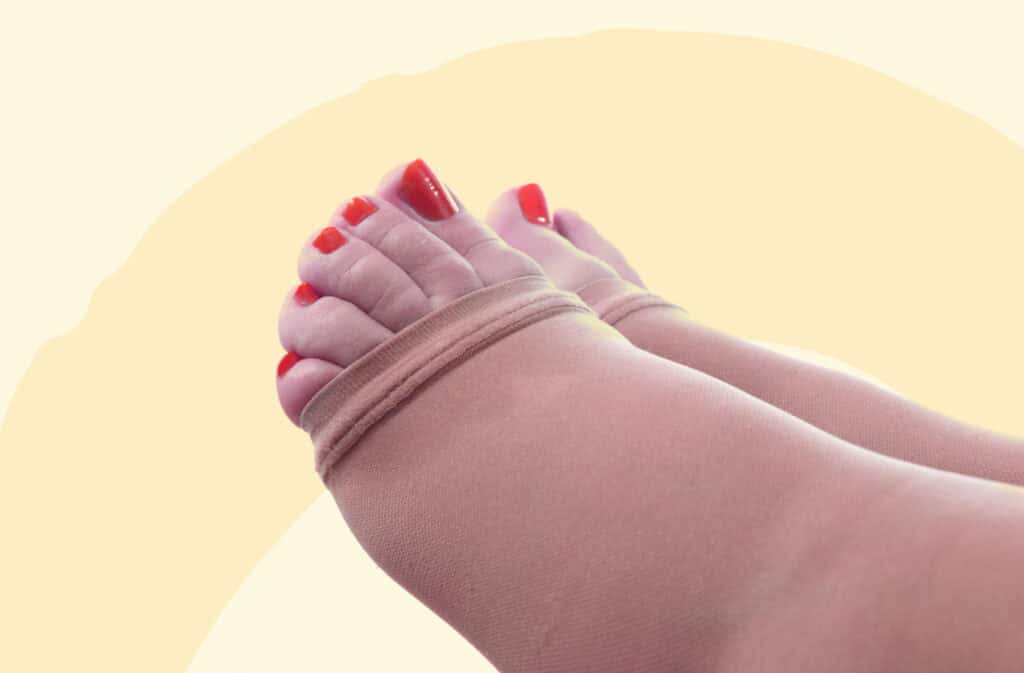
Learn what’s normal, how to reduce swelling, and when to seek urgent medical care for serious conditions like preeclampsia or blood clots.
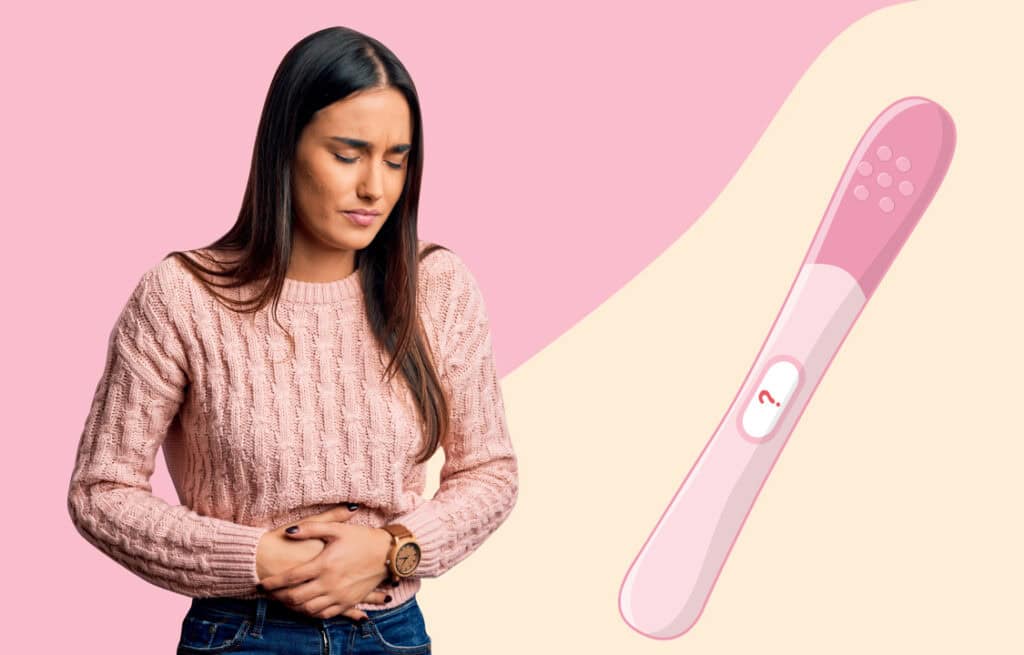
Learn to detect ovulation pain as a sign of your fertile window to increase your chances of pregnancy success.

